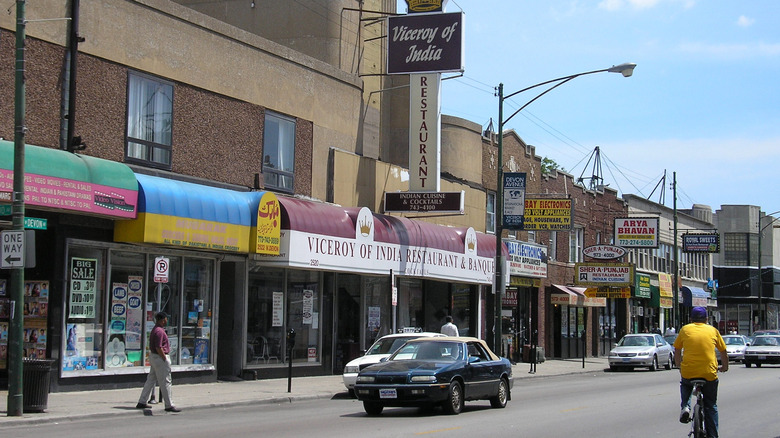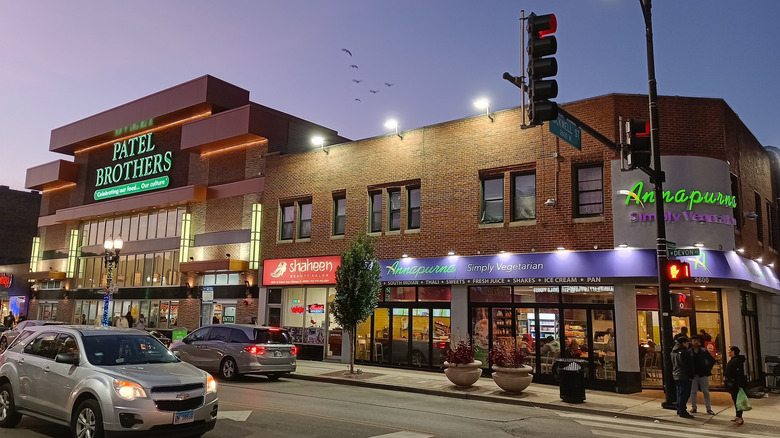Chicago's Vibrant Avenue With Diverse Shopping And Dining Is Known As 'Little India'
Walking down Chicago's Devon Avenue feels like a journey through South Asia. Outside a Hindu temple, the scent of incense drifts through the air as priests ring ghantis (bells). Just a few blocks down, the Adhan, the Muslim call to prayer, echoes from a nearby mosque. Outside, aromas of sizzling tandoori chicken and lamb kabobs spill from open kitchens, while bakeries draw lines of customers eager for jalebi and pani puri. Along the sidewalks, storefronts display vibrant saris, lehengas with gemstones, and embroidered sherwanis, while Bollywood music flows through shops selling traditional sweets, fresh produce, and Indian spices. For many, it's no surprise Devon is often described as "Little India."
Devon hasn't always had a large desi concentration. Originally known as Church Street, this 1-mile stretch between North California Avenue and North Damen Avenue in Chicago's West Ridge neighborhood has seen several cultural changes over the years. In the mid-20th century, it was mostly a typical north-side road until immigrants from Eastern Europe, particularly Russian and Jewish families, moved in and opened businesses. The street's demographic shifted again after the Immigration and Nationality Act of 1965. This federal law opened the door for a new wave of immigrants from South Asia to come to the U.S. Much like Jackson Heights, one of New York's most diverse neighborhoods, Devon became a hub for Bangladeshi, Indian, and Pakistani communities. They brought with them new languages and cuisines along with businesses, grocery stores, and religious centers that reshaped the area.
Explore the flavors and cultures on Devon Avenue
Today, Devon's transformation is reflected across its landscape. Street signs and storefronts highlight the South Asian roots with honorary names like Sheikh Mujib Way (after Bangladesh's first president), Gandhi Marg (after India's prominent anti-colonial activist, Mahatma Gandhi), and Muhammad Ali Jinnah Way (after Pakistan's founding father). Reminders of earlier eras also remain in the area. The Honorary Golda Meir Boulevard pays tribute to Israel's first female prime minister. A handful of kosher delis, bakeries, and a synagogue still hint at the area's Jewish past. Devon's rich history and decades of migration make it one of the most culturally diverse streets in the country.
About 12 miles away from the Chicago O'Hare International Airport, America's most well-connected airport, Devon Avenue is best known for its South Asian food scene. Restaurants like Ghareeb Nawaz serve Pakistani and Indian classics around the clock, while Arya Bhavan and Uru-Swati highlight vegetarian dishes. Nearby, Nepal House offers authentic Nepalese and North Indian specialties. A short walk away, sweet shops serve traditional desserts like barfi and kaju katli with steaming cups of chai. For street food lovers, spots like Sukhadia's serve chaat, samosas, and bhel puri. These are the same kinds of savory snacks found in Mumbai, a global destination with an affordable, adventurous street food scene.
For visitors wanting to bring a piece of Devon back home, the avenue's boutiques sell ethnic clothing, traditional jewelry, and home decor. At the center of it all is Patel Brothers, the largest South Asian grocery chain in the states. Shoppers can find everything from spices and lentils to pickles and fresh produce. Together, these businesses make Devon Avenue a cultural experience unlike anywhere else in Chicago.

